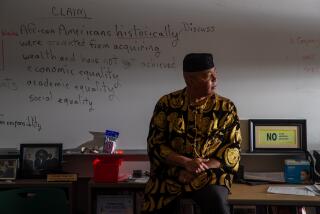A History Professor Gains Insight by Studying FBI Files on Famous Lives : Pop Go the Politics: G-Men in Hollywood
- Share via
It wasn’t just bobby-soxers and paparazzi following Frank Sinatra around all those years.
Turns out the FBI was keeping close tabs on Old Blue Eyes too.
The release last week of the bureau’s surveillance file on Sinatra came as particularly welcome news to Jon Wiener, a history professor at UC Irvine and one of some 30 people who’d filed Freedom of Information requests for the file.
Most of the requests reportedly came from media outlets, and media accounts of the file so far have centered on the long-rumored mob ties of Hoboken’s favorite son. But Wiener is more interested in the political aspects of the file, as part of his long-running academic and journalistic focus on the nexus between politics and pop culture.
It turns out that Sinatra, a friend of such noted anti-Communists as John F. Kennedy and Ronald Reagan, leaned pretty heavily to the left in his younger days. He supported racial integration during the mid-40s, a time when such a stand was considered radical. In 1948, he backed Progressive candidate Henry Wallace for president against Harry S Truman and Thomas E. Dewey. And his name popped up a dozen times in testimony during the House Un-American Activities Committee’s witch-hunt for Communists.
In a way, the Sinatra file completes a trifecta for Wiener, who at 53 has spent some 15 years wresting surveillance documents from the government. His first and most notable pursuit was of the John Lennon file. Richard Nixon’s FBI considered the former Beatle a fellow traveler and agitator; Wiener sought the file while researching a book on Lennon’s political activism.
Then, having nailed Lennon, he went after Marx. As in Groucho.
“I did it as just kind of a shot in the dark, to see if there was anything on Groucho,” Wiener says.
There was. The FBI, suspecting Marx of being a Communist sympathizer, tracked his early political activities and even filed a report analyzing his “You Bet Your Life” television game show for coded messages to Commies underground.
Although that sort of Cold War mentality can seem comical now, its actions had serious effects on the lives of people who were its targets. Wiener’s work is equally serious.
Wiener--who earned his doctorate in history from Harvard and has been teaching at UCI since 1974--is interested in the use of government resources to track the political activities of individuals, despite Constitutional guarantees of free association and speech.
He also sees the files as a source for historical detail that would be otherwise hard to come by.
Wiener said the FBI files can be notably unreliable, containing questionable observations by operatives trying to hustle paychecks. But the files do open doors that otherwise might have remained closed. Some of the material in the files “is hilarious; some of it is pernicious,” Wiener says. “It’s a historical gold mine.”
The FBI as the progressive historian’s friend. Who’d have thought?
*
Daylight bleeds to dusk as Wiener paces slowly at the front of his UCI classroom, slipping from dais to table and back again. As he moves, his fingers intertwine, then separate, like the teeth of a zipper, the act of a man in deep concentration.
The topic for the day is “America in the 1950s: The Hollywood Blacklist” and the wrestling match between the quasi-religions of capitalism and Communism that played out before the House Un-American Activities Committee.
This is where Wiener’s pursuit of history finds its present-day outlet, where the details of history come together. For three hours the students discuss and absorb, switching from Victor Navasky’s “Naming Names,” which explores why some people decided to expose their colleagues as Communists, to “On the Waterfront,” viewed by some as director Elia Kazan’s explanation of why he cooperated with the inquisition that made famous the question: “Are you now or have you ever been a member of the Communist Party?”
Implicit in the lesson are the costs endured by those caught up in the purges. Subpoenas, well into the ‘60s, over personal political beliefs. Jail for some who refused to cooperate. Blacklisting--and unemployment--for others.
The discussion strips the issue to its core, and Communism itself becomes irrelevant as the students focus on the evolution of abstract political tenets--freedom of speech and association--into the concrete reality of jail time for refusing to name names.
Left unanswered is the question of who was right: those who stood on principal against what they perceived to be an assault on their civil rights, or those who cooperated, choosing expediency to keep jobs and families intact.
“I just really like to see why people do what they do, what were the forces driving them, what were the morals at that time, what they held to be the highest form of ethics,” says Jessica Pohle, 22, a senior from San Jose who took her first class with Wiener this fall. “It’s a big ethical question. Do you do the right thing at all costs?”
*
The professor knows of what he teaches.
Wiener has a copy of his own FBI file that began with his involvement in antiwar protests during the ‘60s. The file runs a few dozen pages, he says, and includes notes from interviews with his high school teachers in St. Paul, Minn.
“They stood up for me,” he says, sitting in the living room of the house in West L.A. that he shares with his wife, video artist and Cal Arts professor Judy Fiskin. “They all said I was a loyal American.”
Wiener (who is a contributing editor to Nation magazine) says he strives in the classroom to restrain his own leftist take on history. “But I’m sure they can tell [it’s there],” he says, “even though I try to make the conservative sides of various issues seem plausible and reasonable.”
Actually, out of 250 student evaluations of his work, he says, only one “said Jon Wiener was giving us propaganda and not facts.”
“The class fills up fast [during registration], and that usually has to do with the professor,” says Pohle, who plans a career as an elementary-level teacher. “There’s something about some professors that allow them to conduct discussion classes well.”
Despite his subject matter, Wiener says he doesn’t see his work as helping students explore ethical choices. His main objective is to get them to think critically.
For term papers, he encourages them to delve into the House Un-American committee transcripts, filed at the UCI library, and to come up with their own opinions and theories.
“History is an interpretation,” says Wiener, who traces his own political beliefs to growing up during the Civil Rights era. “What I want to do is show them what the debates are.”
Above all, he says, he’s exposing them to elements of the past to help them better understand the present.
“They want to deal with the origins of the world they know,” he says. “The ‘50s were a long time ago for an 18-year-old today.” But “the drama of the blacklist, the human challenge of whether to betray a friend to keep a job, is something they can relate to intensely.”
The approach seems to be working. One student says that by putting historical events into cultural context, Wiener does more than help enliven potentially dry discussions.
“By understanding where we’ve been, I’ve gained a better perspective in understanding people of older generations, why they are the way they are,” says Karen Malbon, 23, a senior political science major from Los Angeles who wants to be a lawyer.
*
Having grown up at a time when politics intersected with the emergence of pop culture as a dominant (and, some felt, threatening) force, Wiener still thinks of pop culture as key to any understanding of history and change--which explains his continuing interest in people like Lennon, Marx and Sinatra.
He and others had to wait till Sinatra died to request his FBI file (the bureau does not make files available while a subject is still alive, although subjects themselves can get copies). Wiener notes that the material released last week is still not the complete file, just the so-called headquarters file of summary reports and internal communications.
“The raw investigative reports are in the field offices, and they’re still being processed,” Wiener says. “So even now we don’t really have the full extent of what’s in the FBI’s possession.”
More to Read
Get the L.A. Times Politics newsletter
Deeply reported insights into legislation, politics and policy from Sacramento, Washington and beyond. In your inbox twice per week.
You may occasionally receive promotional content from the Los Angeles Times.











